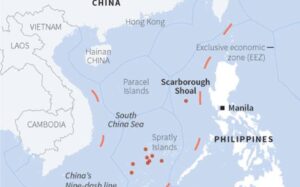26 September 2023 : Daily Current Affair
Daily Current Affairs
26-September-2023
Daily Current Affairs For UPSC ,Daily Current affairs of The hIndu and Indian Express.
1. Monsoon begins its withdrawal.
Topic: GS2 – Indian geography
Context:
- India Meteorological Department (IMD) has officially announced the beginning of the end of the southwest monsoon this year.
- The withdrawal started a week later than the usual date of September 17.
- Monsoon rainfall for this year has been 5% below the normal levels as of Monday.
- The country faced the risk of drought-like conditions due to the influence of El Nino, with August experiencing a significant rainfall deficit of nearly 36%.
Withdrawal of monsoon:
The withdrawal of the monsoon is a significant meteorological event in India. Here are key points about the withdrawal of the monsoon:
- Timing: The withdrawal of the monsoon typically begins in the northwest region of India and gradually progresses towards the southeast. It usually starts around September and can last until early October.
- Factors: The withdrawal is influenced by various meteorological factors, including the movement of the monsoon trough, changes in atmospheric pressure, and the weakening of moisture-laden winds from the southwest.
- Impact: The withdrawal of the monsoon marks the end of the rainy season in many parts of India. It is an essential event for agriculture and affects crop harvesting and planting for the upcoming season.
- Variability: The timing and intensity of monsoon withdrawal can vary from year to year. Factors like El Nino and La Nina can influence the monsoon pattern, leading to variations in withdrawal dates.
- Region-specific: The withdrawal may occur at different times in different regions of India. For example, it may withdraw earlier in northwest India compared to southern or eastern parts of the country.
2. What are the findings of the Parliament panel on NEP?
Topic: GS3 – Indian education System.
Context:
- Parliament Standing Committee on Education, led by BJP MP Vivek Thakur, presented a report on the implementation of the National Education Policy (NEP), 2020 in higher education during a special Parliament session.
What are the key issues mentioned in the Parliamentary report:
- The report emphasized the importance of State involvement in higher education, as 70% of universities in India are under the State Act, and 94% of students study in State or private institutions.
- Key issues discussed included the rigid separation of disciplines, limited access to higher education in disadvantaged areas, lack of local language instruction, faculty shortages, institutional autonomy, research emphasis, regulatory inefficiencies, and undergraduate education standards.
- Recommendations included increasing Gross Enrolment Ratio to 50% by 2035, earmarking funds for disadvantaged groups, enhancing gender balance, providing financial assistance and scholarships, making admissions and curricula more inclusive, developing regional language courses, and ensuring a supportive environment for physically challenged students.
- The committee appreciated Jammu and Kashmir’s prompt implementation of NEP, bringing a shift in teaching methods and lifelong learning opportunities.
- To improve funding for higher education institutions, the committee suggested diversifying funding sources for the Higher Education Financing Agency (HEFA), exploring partnerships with private sector organizations, philanthropic foundations, and international financial institutions, and adjusting loan interest rates to be more competitive and affordable.
- The report expressed concerns about the multiple entry multiple exit (MEME) system, suggesting that it might not work well in India due to unpredictability in student numbers and its potential impact on the pupil-teacher ratio.
3. Jaishankar, Guterres discuss reform of global financial institutions, sustainability.
Topic: GS2 – International relations
Context:
- India’s External Affairs Minister S. Jaishankar held bilateral talks with UN Secretary-General Antonio Guterres.
- The discussions focused on the sustainability agenda and the reform of international financial institutions.
Need for reforms in global financial institutions:
- Enhanced Lending Capacity: Increasing lending capacity allows these institutions, such as the World Bank, to provide more financial support to member countries. This can be crucial for economic development and poverty reduction.
- Equitable Representation: Reforms aim to ensure that member countries, particularly from the Global South, have a fair and proportionate say in decision-making processes. This enhances the legitimacy of these institutions and reflects the diversity of their membership.
- Addressing Critiques: Prominent figures like UN Secretary-General Antonio Guterres have criticized the performance of global financial institutions. Reforms are necessary to address these critiques and improve the effectiveness of these institutions.
- Global South’s Interests: Reforms intend to prioritize the interests and concerns of countries in the Global South. This includes addressing development challenges, income inequality, and promoting sustainable economic growth in these regions.
- Adapting to Changing Global Dynamics: In a rapidly evolving global landscape, financial institutions must adapt to new challenges, such as climate change, digital transformation, and global health crises. Reforms can help these institutions stay relevant and responsive to emerging issues.
4. Eight institutes give an array of reasons for Joshimath sinking
Topic: GS2 – disaster management.
Context:
- Eight premier Indian institutions conducted separate studies on land subsidence in Joshimath, Uttarakhand.
Additional information about the news:
- Likely reasons for land subsidence identified in the reports include seismic activities, construction issues, population pressure, and poor drainage systems.
- Reports raised concerns about non-compliant construction practices, especially a lack of adherence to the National Building Code of India.
- Geological factors, such as geological conditions and past events like flash floods, were cited as contributing to subsidence.
- Some reports recommended controlling water infiltration to minimize internal erosion, while others emphasized safe disposal of water from upper reaches.
- Despite multiple studies, no concrete conclusion was reached, and experts pointed out similarities to previous findings, calling for better regulation of infrastructure development and construction practices in the area.
5. ISRO tests engine for Gaganyaan mission
Topic: GS3 – Science and technology.
Context:
- The Indian Space Research Organisation (ISRO) has successfully conducted the CE20 E13 engine hot test.
- This test is part of the Gaganyaan qualification and 22-tonne thrust qualification.
- The CE20 engine is a crucial component for the Cryogenic Upper Stage (CUS) of the LVM3 vehicle.
About Gaganyaan mission:
- The Gaganyaan mission is India’s first crewed spaceflight mission. It is being developed by the Indian Space Research Organisation (ISRO).
- The Gaganyaan mission will carry a three-member crew to a low Earth orbit (LEO) of 400 km for a period of five to seven days. The crew will then return to Earth and splash down in the Indian Ocean.
- The Gaganyaan spacecraft is being designed and built in India. It will consist of two parts: a crew module and a service module. The crew module will carry the astronauts and will be equipped with all the necessary life support systems. The service module will contain the spacecraft’s propulsion and power systems.
- The Gaganyaan mission is a major milestone for India’s space program. It will demonstrate India’s capability to launch humans into space and return them safely to Earth.
- The mission will also pave the way for future Indian missions to space, including missions to the Moon and Mars.
6. Interpol issues Red Notice against BKI terrorist.
Topic: GS2 – International relations
Context:
- Interpol has issued a Red Notice against Karanvir Singh, an alleged terrorist associated with the Babbar Khalsa International (BKI).
List of interpol notices:
Interpol issues several types of notices to assist in international law enforcement and cooperation. These notices include:
- Red Notice: A request to locate and provisionally arrest an individual pending extradition. It’s often referred to as an international “wanted” notice.
- Blue Notice: A request to collect additional information about a person’s identity, location, or activities to help prevent or solve crimes.
- Green Notice: A warning about a person’s criminal activities when that person has committed criminal offenses and is considered a possible threat to public safety.
- Yellow Notice: A request to help locate a missing person, especially a minor, or to help identify a person who is unable to identify themselves.
- Black Notice: A request for information about unidentified bodies.
- Orange Notice: A warning about an event, object, person, or process that poses an imminent threat to public safety.
- Purple Notice: A request to seek or provide information on modi operandi, objects, devices, or concealment methods used by criminal.
7. US exploring hotline with China to tackle crises in space
Topic: GS2-IR
Context:
- The United States Space Force has had internal discussions about setting up a hotline with China to prevent crises in space.
Details:
- A direct line of communication between the Space Force and its Chinese counterpart would be valuable in deescalating tension.
- US Space Force is looking into establishing a branch in Japan, as China’s military ambitions in the Indo-Pacific has unsettled its neighbours.
- Also the war in Ukraine highlights the importance of space capabilities in warfare.
What is Space Warfare?
- Space warfare refers to the use of outer space for military purposes, including the development and deployment of offensive and defensive capabilities in space.
- While space has traditionally been considered a domain for peaceful and scientific activities, there are growing concerns about the potential militarization of space due to advances in technology and the strategic importance of space assets.
- Space warfare is a complex and multifaceted topic that can be relevant in discussions about international security, arms control, and the future of space exploration and utilization.
8. Philippines removes floating China barrier at disputed shoal
Topic: GS2-IR
Context:
- The Coast Guard of China was accused by the Philippines recently of installing a “floating barrier” in the South China Sea’s disputed area.
- In response Philippines executed a “special operation” to remove the floating barrier installed by China at a prime fishing patch in the South China Sea, a move that could stoke tension after a years-long detente in Asia’s most disputed waters.
Details:
- The Philippines expressed outrage and shared images of Chinese coastguard policing along, ball-buoy barrier near the Scarborough Shoal, a rocky outcrop 200 km from the Philippines and the site of years of intermittent flare-ups over sovereignty and fishing rights.
About Scarborough Shoal:
- Scarborough Shoal is located in the eastern part of the South China Sea.
- It is uninhabited and shaped like an atoll consisting mainly of rocks and barely consists of any land except for very small islands.
- It is located at about 220 kilometers from the Philippines and is located inside the Exclusive Economic zone of the Philippines.
- Its location is much closer to the Philippines’ shore as compared to the China’s shore.
- It is also referred to as ‘Bajo de Masingloc’and ‘Panatag’ by the Philippines and ‘Huangyan Island’ by China.
- The present name Scarborough was given after an East India company’s ship named ‘Scarborough’got grounded on one of the rocks in the atoll.

9. Nepal, China sign 12 agreements during Prachanda’s visit to Beijing
Topic: GS2-IR
Context:
- China and Nepal on signed 12 agreements, including seven MoUs, to enhance bilateral cooperation in sectors including trade, road connectivity, and information technology after Premier Li Qiang and Prime Minister Pushpa Kamal Dahal ‘Prachanda’ held wide-ranging talks in Beijing.
How Nepal-China Proximity can affect India?
Nepal’s relationship with China can have several implications for India due to its geographical proximity and historical ties with both countries. Here are some ways in which Nepal-China relations can affect India:
- Strategic Implications: Nepal’s deepening ties with China could have strategic implications for India, particularly in terms of border security and regional geopolitics. China has been involved in infrastructure development projects in Nepal, including road and rail links, which can impact the movement of goods and people along the India-Nepal border.
- Economic Impact: Closer economic cooperation between Nepal and China could affect India’s economic interests in Nepal. For instance, China’s investments in Nepal’s infrastructure and energy sectors might provide an alternative to India’s influence in these areas.
- Political Dynamics: Changes in Nepal’s political landscape, including shifts in leadership or government policies, can influence its relations with both India and China. Nepal’s efforts to balance its relations with its two giant neighbors can have implications for regional stability.
- Security Concerns: Nepal’s proximity to Tibet, an autonomous region of China, can have implications for India’s security concerns. India closely monitors developments in Tibet, and any significant changes in that region could affect India’s security calculus.
- Bilateral Disputes: Nepal and India share a long border with open access. Disputes between Nepal and India, such as those related to border demarcation or trade issues, can influence Nepal’s approach toward China or vice versa.
- Belt and Road Initiative (BRI): Nepal’s participation in China’s Belt and Road Initiative (BRI) has been a point of interest for India. India has concerns about the strategic implications of BRI projects in the region and how they might affect its influence in neighboring countries like Nepal.
- Diplomatic Relations: India has historically had close diplomatic, economic, and cultural ties with Nepal. Changes in Nepal’s foreign policy orientation, including strengthening its relationship with China, can impact India’s diplomatic efforts and influence in the region.
- Regional Dynamics: Nepal’s relations with China and India are part of a broader web of regional dynamics in South Asia. These dynamics can influence regional organizations like the South Asian Association for Regional Cooperation (SAARC) and regional security architecture.
- People-to-People Ties: Cultural, familial, and people-to-people ties between India and Nepal are strong and historic. These ties often transcend political and diplomatic considerations, but they can still be affected by changing geopolitical dynamics.
10. New study on Asola Bhatti wildlife sanctuary in the works
Topic: GS3-Environment
Context:
- The Wildlife Institute of India (WII), Dehradun, is likely to conduct a study on the biodiversity of the Asola Bhatti Wildlife Sanctuary in Delhi and prepare a management plan.
Details:
- A report released last year based on a camera-trap study at the sanctuary, which covers an area of 32.71 sq km and is part of the Ridge in South Delhi, had pointed to the presence of eight leopards and two to four striped hyenas at the sanctuary.
Objectives:
- One of the objectives of the study is to evaluate “potential socio-economic changes” on the life of nearby villages “by maintaining the ecological integrity of the ecosystem to ensure the wise use of common ecological goods and services”.
- It will also look at delineation of the mined-out pits and their attributes, including the plant and animal components and habitats associated with them, and promoting “sustainable eco-tourism”.
About Asola Bhatti Wildlife Sanctuary:
Location:
- The sanctuary covering a 32.71 sqkm area on the Southern Delhi Ridge of the Aravalli hill range on the Delhi-Haryana border lies in Southern Delhi and northern parts of Faridabad and Gurugram districts of Haryana state.
- It is also part of the Sariska-Delhi Wildlife Corridor, which runs from the Sariska Tiger Reserve in Rajasthan to Delhi Ridge.
Vegetation: Dry deciduous,
- Flora: Consists of Prosopis juliflora as the dominant exotic species and Diospyros montana as the dominant native species in the sanctuary.
- Fauna: Golden Jackals, Striped-Hyenas, Indian crested-Porcupines, Civets, Jungle Cats, Snakes, Monitor Lizards, Mongoose etc.
11. Rozgar Mela at 41 locations: PM to hand out 51,000 job letters today
Topic: Prelims, GS3-Economy
Context:
- Prime MinisterNarendra Modi will distribute about 51,000 appointment letters to newly inducted recruits in Government departments and organisations under Rozgar Mela.
Will Rozgar Mela solve India’s unemployment crisis?
- Rozgar Melas can certainly play a role in addressing unemployment by creating a platform for job seekers and employers to interact directly.
- These events provide an opportunity for job seekers to explore various employment options, submit resumes, attend interviews, and possibly secure job offers.
- This can lead to quicker placements and reduce the time individuals spend searching for suitable job opportunities.
- However, Rozgar Melas alone may not completely solve India’s unemployment crisis.
12. Supreme Court sets up 7-judge bench to review 1998 verdict
Topic: GS2-Polity
Context:
- The Supreme Court referred to a seven-judge bench the question of whether the legal immunity of legislators under Articles 105(2) and 194(2) of the Constitution protects them from being prosecuted in a criminal court for the offence of offering or accepting a bribe.
Details:
- In its 1998 ruling, the top court had held that legislators have immunity against criminal prosecution on bribery charges for any speech or vote in Parliament.
What are the provisions that grant legislators immunity from prosecution?
- Article 105 of the Indian Constitution safeguards the freedom of speech of Members of Parliament within the Parliament and allows Parliament to determine and specify its powers, privileges, and immunities through legislation.
- This article plays a significant role in upholding the functioning of India’s parliamentary system and ensuring that MPs can carry out their duties without fear of legal repercussions for their parliamentary activities.
- Article 194(2) of the Indian Constitution grants powers, privileges, and immunities to Members of State Legislative Assemblies (MLAs) in India.
- These powers and privileges are to be defined by the respective State Legislatures through legislation, and until defined, they are based on existing practices and traditions within the State Legislative Assembly.
For Enquiry

26 September 2023 : Daily Current Affair

26 September 2023 : The Hindu Editorial Notes PDF

25 September 2023 : Daily Quiz

25 September 2023 : Daily Answer Writing

25 September 2023 : Indian Express

25 September 2023 : PIB

25 September 2023 : Daily Current Affair

25 September 2023 : The Hindu Editorial Notes PDF

23 September 2023 : Daily Quiz

23 September 2023 : Daily Answer Writing
Daily Current Affairs 26 September 2023 : Daily Current Affair Daily Current Affairs
25-September-2023
Daily Current Affairs For UPSC ,Daily Current affairs of The…
September- The Hindu Editorial 26 September 2023 : The Hindu Editorial Notes PDF The Hindu Editorial
26-September-2023
Daily Current Affairs For UPSC ,The Hindu Editorial Summary
Facebook-f
Twitter
Youtube
1. On…
Daily Quiz 25 September 2023 : Daily Quiz 25 Sep 2023 : Daily Quiz…
mains answer writing 25 September 2023 : Daily Answer Writing Mains Answer Writing
One of the key components of these exams is the written test, which consists of…
Indian Express 25 September 2023 : Indian Express Indian Express
25-September-2023
The Indian Express, CSE candidates can stay informed about current…
PIB 25 September 2023 : PIB PRESS INFORMATION BUREAU
25-September -2023
Daily Current Affairs For UPSC ,The PIB ( Press Information…
Daily Current Affairs 25 September 2023 : Daily Current Affair Daily Current Affairs
25-September-2023
Daily Current Affairs For UPSC ,Daily Current affairs of The…
September- The Hindu Editorial 25 September 2023 : The Hindu Editorial Notes PDF The Hindu Editorial
25-September-2023
Daily Current Affairs For UPSC ,The Hindu Editorial Summary
Facebook-f
Twitter
Youtube
1. An…
Daily Quiz 23 September 2023 : Daily Quiz 23 Sep 2023 : Daily Quiz…
mains answer writing 23 September 2023 : Daily Answer Writing Mains Answer Writing
One of the key components of these exams is the written test, which consists of…




